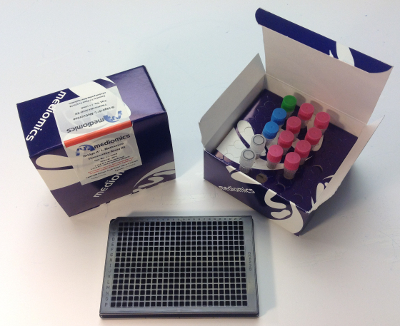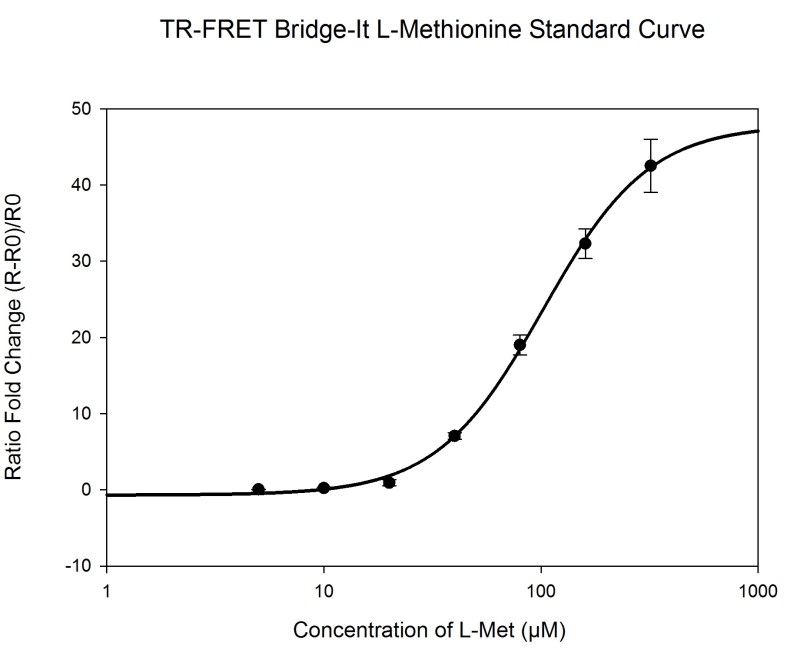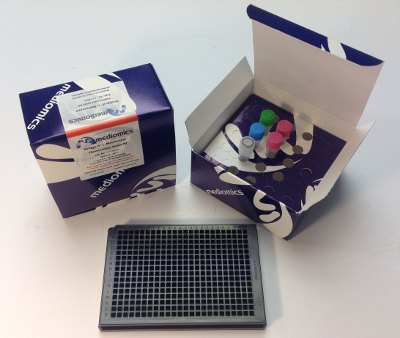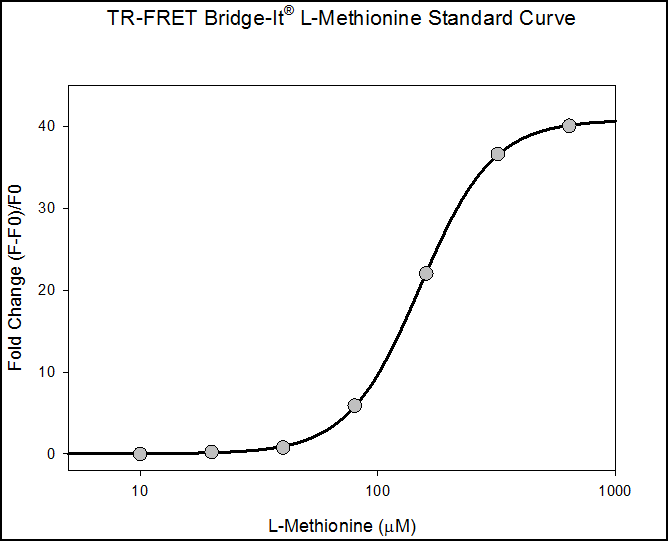TR-FRET Bridge-It® L-Methionine (L-Met) Fluorescence Assay Kit, 384-well format
The Mediomics Bridge-It® L-methionine fluorescence assay method is based on a combination of well-established fluorescence measurement techniques and a new assay platform design that utilizes DNA-binding proteins as biosensors for their respective small molecule coregulators (ligands). The affinity of the DNA sequence-specific MetJ methionine repressor protein for its unique DNA binding site is greatly increased in the presence of its ligand, S-adenosyl methionine (SAM). For this assay, the MetJ consensus sequence was split into two approximately equal DNA “half-sites” with one half fragment labeled with fluorescein and the other half fragment labeled with Oyster® 645 fluorophore3,4. The relative amount of SAM present in a test sample will influence the amount of DNA-MetJ protein complex formation in the assay. When this complex forms, it brings the fluorescence labeled-DNA half-sites into close proximity and causes a measurable change (increase) in fluorescence signal emission that can be readily measured using a microplate reader (wavelength settings: absorption 485 nm; emission 665 nm).
$175.00 – $525.00
Description
TR-FRET Bridge-It® L-Methionine (L-Met) Fluorescence Assay Kit, 384-well format
Applications:
-
Direct measure of L-Met level in samples
-
Assays for enzymes involved in using Met as the substrate or Met as the product (i.e. methionine aminopeptidase)
Features:
-
Easy: Mix test sample or standard with the Assay solution and incubate. Absolutely no wash steps!
-
Read fluorescent signal after 50 minutes of incubation
-
Sensitive: Assay measures L-Methionine at a lower limit of detection of 10 µM
-
Flexible: Assay is available in FRET and TR-FRET format, can be adapted to colorimetric format upon request.
-
Specific: No crossreactivity with the standard amino acids or L-Met derivatives (L-Met Sulfoxide and L-Met Sulfone).
Background Information on L-Methionine and the TR-FRET Bridge-It® Fluorescence Assay
L-Methionine (L-Met)
L-Methionine is an essential amino acid that must be obtained from food sources or from dietary supplements. It is a precursor for other sulfur compounds including cysteine, taurine, and glutathione. Methionine reacts with adenosine triphosphate to form S-adenosyl methionine (SAM), which is the principal methyl donor in the body and contributes to the synthesis of many important substances, including epinephrine and choline. L-methionine is also an important supplement for animal feed. Currently, L-methionine is quantified using the high pressure liquid chromatography (HPLC) method. HPLC is time consuming, costly, and, due to the large amount of organic solvent required, not environmentally friendly.
TR-FRET Bridge-It® L-Methionine Fluorescence (L-Met) Assay1,2
Eukaryotic cells contain an estimated 3,000 sequence-specific DNA binding proteins. These important proteins, acting either with or without a specific small molecule coregulator (ligand), control all aspects of genomic DNA activity including gene expression, DNA replication, and DNA repair. Mediomics is applying its novel fluorescence assay platform to develop in vitro assays useful for rapidly and sensitively quantifying the activity of both DNA binding proteins and their small molecule ligands.
The common property of all sequence-specific DNA binding proteins is their ability to bind with high affinity and specificity to a DNA duplex containing a unique nucleotide sequence- i.e. the DNA binding site for the protein.
Mediomics’ novel assay platform relies on this common characteristic. A DNA duplex containing the sequence-specific DNA binding site for a given target DNA-binding protein is split into two DNA “half-site” duplexes each having a short single-stranded overhang. These single-stranded extensions are short enough so that in the absence of the target protein little spontaneous re-association occurs. When the target protein is present, however, its high affinity for the full-length DNA sequence will drive the re-association of the two half-site DNA duplexes. This re-association can be sensitively detected by incorporating a two fluorophore system [a donor (Eu3+) and an acceptor] into each of the two DNA half-sites. In this assay, the DNA binding protein acts as a biosensor for its specific ligand (SAM). The ligand binds to the DNA binding protein, activating the binding site by a conformational change. The presence of the activated DNA binding protein is detected as an increase in fluorescence signal of the acceptor fluorophore or as a decrease in fluorescence signal of the donor fluorophore as a result of Time Resolved fluorescence resonance energy transfer (TR-FRET) between the two fluorophores.
The Bridge-It® L-methionine fluorescence assay method exhibits highly desirable performance characteristics including a high signal to background (S/B) ratio, a good linear dynamic range, and, a limit of detection of ~10 μM. The total assay time is 50 minutes.
Note: This standard curve is for reference only. Please generate your own standard curve.
In contrast to the HPLC procedure, the Bridge-It® L-Methionine fluorescence assay method utilizes the 384 and 96-well microplate format. Thus, it is ideally suited for the rapid, simultaneous measurement of L-methionine levels in large numbers of test samples. Also, this method is readily adaptable to the high-throughput screening platforms currently being used in drug discovery research.
Pricing: The 100-well kit is a one-time trial purchase. For bulk pricing options, please contact us. For any other questions or comments, please do not hesitate to contact us. We are always happy to help!
For information on the assay principle please see the TR-FRET Bridge-It® Assay Technology Platform page or download the protocol. This product is protected by patents and pending patents.
The TR-FRET version of the Bridge-It® L-Methionine Assay is brand new, so there are currently no references for it. However, below are publications that have used our Bridge-It® L-Methionine Assay Kit.
Selected Customer Publications using Mediomics’ Bridge-It L-Methionine Fluorescence Assay Kit:
1. Batra V, Verma P. Dietary L-methionine supplementation mitigates gamma-radiation induced global DNA hypomethylation: Enhanced metabolic flux towards S-adenosyl-l-methionine (SAM) biosynthesis increases genomic methylation potential. Food Chem Toxicol. 2014 Jul;69:46-54.
— “…l-methionine and SAM assay kit was purchased from Mediomics Inc. (St. Louis, MO, USA).”
2. Murray TVA, Dong X, Sawyer GJ, Caldwell A, Halket J, Sherwood R, Quaglia A et al. NADPH oxidase 4 regulates homocysteine metabolism and protects against acetaminophen-induced liver damage in mice.Free Radical Biology and Medicine. 2015.
— “Methionine was measured in extracts from Wt and Nox4 -/- mouse livers using a Bridge-It® l-Methionine (l-Met) Fluorescence Assay (Mediomics) as per the manufacturer’s protocol.”
Click here for the full list of our Customer Publications.
-
Bridge- It® is a registered trademark of Mediomics, LLC, St. Louis, Missouri, U.S.A. Mediomics has a worldwide, exclusive license for this assay platform from Saint Louis University, St. Louis, Missouri.
-
The Bridge-It® L-methionine fluorescence assay kit is provided for laboratory R&D use only. This product is not approved by the U.S. Government or by the government of any other country of the world for use in clinical diagnosis of disease or treatment of disease in humans or animals.
-
Oyster® is a registered trademark of Denovo Biolabels, GmbH, Munster, Germany.
-
Flownamics® Analytical Instruments, Inc., Madison, Wisconsin, is the authorized U.S. distributor of Oyster® dyes.





